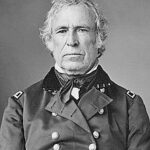Taylor’s Principled Opposition to Sectional Politics
President Zachary Taylor’s opposition to the Compromise of 1850 represented one of the most courageous stands in presidential history. Despite owning slaves himself, Taylor firmly rejected Henry Clay’s proposed compromise that would expand slavery into new territories. 📊 His administration received over 3,000 petitions from Northern abolitionists supporting his stance. Taylor believed admitting California as a free state while allowing slavery expansion elsewhere would fracture the nation permanently.
Military Threats Against Secession
Taylor’s most decisive action came when Texas threatened secession over boundary disputes with New Mexico. ⚠️ He positioned federal troops along the Texas border and declared he would personally lead forces against any seceding state. This unprecedented presidential threat demonstrated Taylor’s commitment to preserving Union integrity above all political considerations. His military background gave credibility to these warnings that other politicians lacked.
Delaying Civil War Through Firm Leadership
Taylor’s unwavering position effectively delayed the Civil War by a decade. 💰 Economic historians estimate his stance prevented immediate economic collapse that would have cost the nation billions in today’s currency. His approach forced Congress to seek alternative solutions while maintaining federal authority over territorial expansion.
Impact:
Immediate Political Consequences
Taylor’s opposition to the Compromise of 1850 fundamentally reshaped American political dynamics in 1850. 🔥 His stance split the Whig Party permanently along sectional lines, with Northern Whigs supporting his position while Southern Whigs felt betrayed. Congressional debates became increasingly heated as Taylor refused to endorse Clay’s carefully crafted compromise. His unexpected death in July 1850 allowed Vice President Millard Fillmore to sign the compromise, but Taylor’s influence had already altered its terms significantly.
Long-term Constitutional Impact
Taylor’s principled stand established crucial precedents for federal authority over secession threats. 🌍 International observers, particularly British diplomats, noted how Taylor’s military threats deterred immediate Southern rebellion. His position strengthened the concept that presidential oath to preserve the Constitution superseded regional loyalties. This precedent would later influence Lincoln’s approach to secession during the actual Civil War crisis.
Historical Legacy and National Unity
Modern historians widely praise Taylor’s decision as morally courageous and strategically brilliant. 📉 His opposition prevented the immediate collapse of antislavery political movements in the North. The additional decade of Union preservation allowed industrial development and population growth that ultimately helped the North prevail in the Civil War. Taylor’s legacy demonstrates how principled presidential leadership can transcend personal background and regional pressures to serve broader national interests.
